GIARI
Cultivating Talented Individuals:Summer Institute
Waseda & Erasmus Mundus-GEM PhD School Joint Summer Institute 2011
2011.08.01
Program Outline
- Theme: Europe-Asia: Comparative Regional Integration
- Term: August 1 (Monday)–August 5 (Friday)
- Venue: Waseda University, Building No.19, Room 710
- Program contents:
- Lectures & Discussion (Aug 1., 2 , 4, 5)
Morning sessions: Lectures by leading professors on the subject
Afternoon sessions: Student presentations and discussions - Fieldtrips(Aug 3)
Site visits to a government agency and a private company
- Lectures & Discussion (Aug 1., 2 , 4, 5)
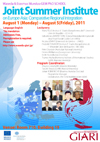 Poster [575KB]
Poster [575KB]
The Waseda University Global COE Program, the Global Institute for Asian Regional Integration (GIARI), is accepting applications from PhD students to attend the Joint Summer Institute on Europe-Asia: Comparative Regional Integration. The Institute will provide students the opportunity to deepen their knowledge about regional integration in Europe and/or Asia and expand their research networks.
The Summer Institute encourages the application of PhD students conducting theoretical and empirical research on issues related to regional integration in Europe and/or Asia from various aspects, including but not limited to politics, security, human security, economics, sociology, culture, and environment. The Institute will provide a supportive environment where students can share their ideas, receive feedback on their research projects, and offer constructive and critical advice to other participants. The five-day program will also include advice on practical matters such as conducting fieldwork. The program will include a number of panels, providing students the opportunity to present their work with the aim to potentially publish the best papers in the Asian Regional Integration Review published by GIARI.
Professors and Schedule
Program Coordinators:
- Shujiro URATA(GIARI, Waseda University)

- Takashi TERADA(GIARI, Organization for Asian Studies)

August 1 (Mon)
Greeting
- Takashi TERADA (Waseda University)
Opening Remarks
- Satoshi AMAKO (Waseda University, Leader of GIARI)
MC:
- for lectures : Takashi TERADA
- for presentation 1& 2: Takeshi ODAIRA
- for presentation 3: Bernard ONG
Lecturers:
- Mario TELO(Institut d’Études Europèennes de l’Universitè Libre de Bruxelles – IEE-ULB)

- CV [18KB]
- Title of presentation: “EU studies and International relations. Comparative regionalism and varieties of multilateral cooperation”
- outline [12KB]
- references [10KB]
- Peter Drysdale(Australian National University)

- CV [74KB]
- Title of presentation: “East Asian Summit and the Asia Pacific Community?”
- PPT file [193KB]
Presentations:
- Pilar Preciousa Pajayon BERSE(Waseda University (GSAPS))
Title: “Locating Synergies and Identifying Gaps: Regional Programmes and Activities for Higher Education in ASEAN and its Implications for Regional Integration” - Maria Ulrika, Elisabeth LARSOON(Tsinghua University(清華大学)")
Title: “Nuclear Terrorism and the Security Governance of China and the European Union. Further Security Cooperation made possible?” - Justin BROWN(University of Warwick)
Title: “Chinese State-Owned Enterprises and Australia’s Foreign Investment Regime: Rational Decisions or Instinctual Reactions?”
Orientation (for the students)
External Evaluation Meeting (for professors at Room 713)
Welcome Party at Cafè 125 on Campus
- MC: Hideyuki MIURA, Seiko MIMAKI
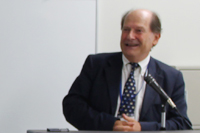

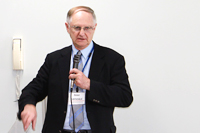
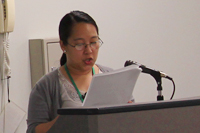
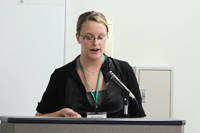
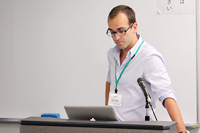
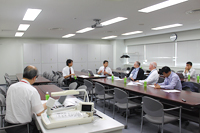
August 2 (Tue)
MC
- for lectures: Jeet SAPKOTA
- for presentation 1& 2: Aminuddin Bin BAKI
- for presentation 3& 4: Jeet SAPKOTA
Lecturers:
- Frederik PONJAERT(Institut d’Études Europèennes de l’Universitè Libre de Bruxelles – IEE-ULB)

- Academic CV [80KB]
- Official Title: Associated Researcher Belgian National Research Foundation (F.R.S-Fnrs); Universitè Libre de Bruxelles – Institut d’Études Europèennes (ULB-IEE) & Katholieke Universiteit Leuven – Japan Studies (KULeuven)
- Title of presentation: “Lessons from Europe on Comparative Regionalism : Pitfalls, Potentialities & Perspectives”
- Abstract [75KB]
- In-Jin Yoon(Korea University)

- CV[244KB]
- Title of presentation: “International Migration, Transnationalism, and Multiculturalism in East Asia”
- paper [482KB]
Presentations:
- Jiuan ZHANG(Aalborg University Denmark)
Title: “ASEAN plus Three (APT) as an integration‐oriented institution: origin, process and outcome” - Theoben Jerdan Catindig OROSA(Waseda University (GSAPS))
Title: “ASEAN Integration of Human Rights: Problems and Prospects for Legalization and Institutionalization” - Yoon eui KIM(Korea University (高麗大学))
Title: “North Korean Human Rights Problem and Implication for the Regional Human Rights Regime”
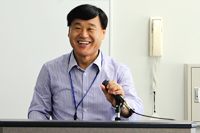
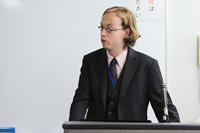

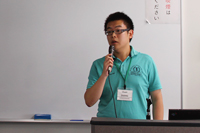
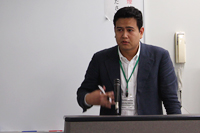
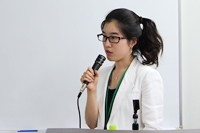

August 3 (Wed)
- Field Trip
- Visit to Ministry of Foreign Affairs, led by Prof. Urata and Staff
- Visit to Sony Corporation Headquarters, led by Prof. Urata and Staff
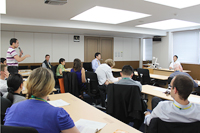
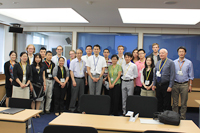
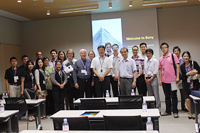
August 4 (Thu)
MC
- for lectures: Hiro KATSUMATA
- for presentations: Farazi Binti FERDOUS
Lecturers:
- Sebastinano MAFFETTONE(Libera Universita Internazionale degli Studi Sociali Guido Carli: LUISS)

- CV [442KB]
- Official Title: Dean of the Faculty of Political Science and Professor of Political philosophy at LUISS Guido Carli University of Rome
- Title of presentation: “From Liberal Multiculturalism to Multicultural Liberalism”
- abstract[22KB]
paper[134KB] - Dennis McNamara(Georgetown University)

- CV [16KB]
- Title of presentation: “A Sociology of Regions – Institutions, Identities and Asian Integration.”
- Abstract and References [186KB]
- Powerpoint [129KB]
Presentations:
- Javad Foronda Heydarian(University of the Philippines)
Title: “Mapping Regional Integration in West Asia: a Comparative Approach” - Max REBOL(Fudan University(復旦大学))
Title: “Explaining China’s Soft Power in the Developing World: Pragmatism and Non- Interference” - Ryo HINATA-YAMAGUCHI(Unibersity of New South Wales-Australian Defense Force Academy)
Title: “Re-conceptualizing East Asian security: Ecological military capability management as an alternative towards regional security and arms control” - Anna CHUNG(IEE-ULB)
Title: “Time Variant in Rational Choice Analysis of Institutional Development: Cases of Tripartite Environment Ministers' Meeting and ASEAN+3 Finance Ministers' Meeting”
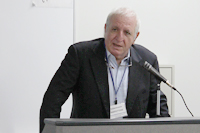
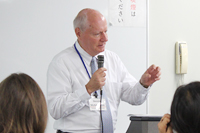
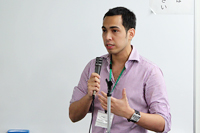
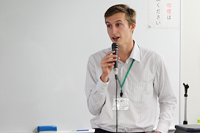
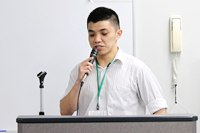

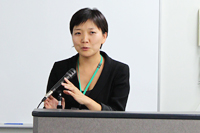
August 5 (Fri)
MC
- for lectures: Miki HONDA
- for presentations: Christian WIRTH
Lecturers:
- Nicolas LEVRAT(Universitè de Genève – UNIGE)

- CV [89KB]
- Official Title: Professor and Director of the European Institute at the University of Geneva
- Title of presentation: “Integration through law”: how relevant is the European experience for IR?
- Abstract of presentation [9KB]
- List of references [11KB]
- Tsuneo Akaha(Monterey Institute of International Studies; GIARI, Waseda University)

- CV [52KB]
- Title of presentation: “East Asia Security Framework: A Neo-liberal Institutionalist Perspective”
- ppt file [53KB](20110714revised)
Presentations:
- Kei KOGA(Tufts University, USA)
Title: “Explaining Transformation of ASEAN's Security Roles in East Asia: Cases of ARF and ASEAN+3” - Pola CEBULAK(IEE-ULB)
Title: “Constitutionalism, pluralism and the role of human rights in shaping the relations between legal orders” - Ganjar NUGROHO(Waseda University (GSAPS))
Title: “Regimes, Interests and Power in International Economic Cooperation and Integration”
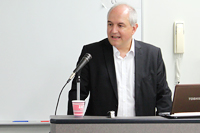
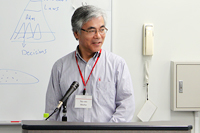

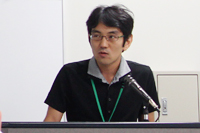
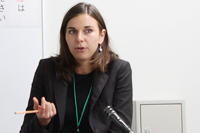
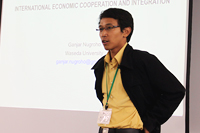
Closing Remarks
- Shujiro URATA (Waseda University)
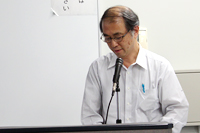
Farewell Party at Bamboo Room on Chinzan-so
- MC: Bernard ONG, Kinuyo KAWAJI

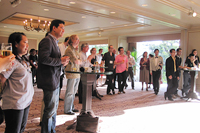


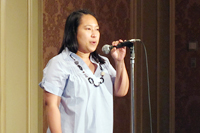




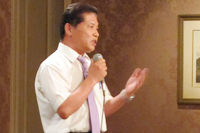
Closing Remarks
Waseda University GCOE & Erasmus Mundus-GEM Joint PhD Summer Institute 2011
Closing Remarks
By Prof. Shujiro URATA

Prof. Urata started with the discussion about the Japanese economy that is facing a very difficult situation. He divided the problems into two broad types. One is the long term structural problem and the other is the short term transitional problem. Long term problem includes the most important demographic factor in particular the declining population problem which directly affects the growth of the economy. Through the declining labor input and also due to the aging population, the savings rate is also declining from 20% to 2-3%. And with this declining savings rate Japan cannot expect capital inputs to grow unless it successfully attracts foreign capital. Again, attracting foreign workers is another option to increase labor input. But these two alternatives cannot be taken in action within the short time period. Therefore, it is important to increase or improve productivity which is a challenge that Japan is facing. The short term problem relates to the three disasters which Japan has faced recently after the earthquake; shortage in electricity, sharp appreciation of yen and high corporate income tax. Japan has one of the highest corporate income taxes in the region. There was talk about reducing the tax before the earthquake but now it is going to increase instead, to finance the government expenditure to deal with the disasters. These three are affecting the Japanese companies in every aspect and many companies are thinking of out locating the production unit outside Japan.
Prof. Urata argued at this point that, one possibility is to signing enough FTAs, and also engaging in EPA and TPP, which will open up markets for Japanese exports. It is already known that because of agriculture, it is difficult to sign FTAs. Most of the FTAs are under negotiations but recently China & Japan has become very close which is surprising and they will take initiatives to speed up the ASEAN+3 and ASEAN+6 processes. Prof. Urata thinks that China is interested in speeding up the process of regional integration in East Asia in response to TPP and Japan is interested in taking a lead in regional integration in East Asia. Therefore, until recently Japan and China were competitors, but now they have decided to make this proposition by speeding up the process of East Asian regional integration. He mentioned that lately USA became very interested in TPP, may be because USA saw regional integration being constructed in East Asia. So, TPP was in response to Asian regionalism and East Asian regionalism seems to move forward in response to TPP. At the same time it will be very interesting to see how ASEAN respond to this movement of China and Japan in speeding up the process of East Asian regionalism.
On the issue of Asia and Europe, as an economist, Prof. Urata is interested to see the impact of EU and EU integration on member economies. What influence does it have on the income distribution, flow of goods, capital and people? Although this is final year for GIARI, he believes that some other initiatives will take over GIARI's activities. This event was only the beginning of the collaboration and he hopes to continue the long last relationship which has just began.
Binti Ferdous
Waseda University GCOE & Erasmus Mundus-GEM Joint PhD Summer Institute 2011Closing Remarks
By Prof. Shujiro Urata[80KB]
From the Participants’ Questionnaire
How did you learn about this Summer Institute?
| By your academic advisor or other professors | 4 |
| By a friend | 4 |
| Poster (for Waseda students) | 2 |
| GEM PhD school | 2 |
| Website (GIARI, GSAPS, Waseda-net portal) | 1 |
How did you find the field trip?
Good! 【all of the participants】- We had a chance to visit both the top bureaucracy and cooperation sectors.
- Both MOFA and Sony meetings were very interesting and useful to better understand where Japan is heading towards.
Will this Summer Institute be useful in your future research activities?
- in deepening your knowledge
- by lectures
1
disagree2
–3
–4
–5
AgreeThe number of people - - 1 5 7 - by presentations
disagree
1–
2–
3–
4Agree
5The number of people 1 - 2 6 4
- by lectures
- in developing your theory and methodology
- by lectures
disagree
1–
2–
3–
4Agree
5The number of people - - 4 3 6 - by presentations
disagree
1–
2–
3–
4Agree
5The number of people 1 1 3 4 4
- by lectures
- in constructing your argument
- by lectures
disagree
1–
2–
3–
4Agree
5The number of people - - 2 7 4 - by presentations
disagree
1–
2–
3–
4Agree
5The number of people 1 - 3 6 3
- by lectures
- In making your research network?
-
disagree
1–
2–
3–
4Agree
5The number of people - - 2 3 8
-
As a result of this program, have your ideas about regional integration in Asia changed? If so, how?
- Yes!
- Yes, the conference provided a very interesting overview of the "hot topics" currently discussed in the context of Asian integration. The comparison with the European integration and integration in other regions especially interesting.
- Definitely, both theoretically and psychologically. More importantly, I have gained at better understanding of development and issues that can influence integration in varying regions.
- Yes, due to being so lucky to attend lectures by such distinguished professors. I have been exposed to new ideas on regionalism which we updated to fit the contemporary world we live in -interesting. I have also gained new ideas of the purpose and methodology of comparative regional studies.
- Confirmation that there is still a long way to go, yet there is a willingness to move forward, and recognition of its importance.
- I can have more comparative perspective between Asia and Europe.
- Yes, coming from a different background I have greater idea regarding regional integration. I believe that all the students, who have come from various backgrounds, will forward their experience from this program to contribute to achieving regional integration.
- Asian integration is much more complex than it is. I didn't realize the depth and reach and extend of areas that I, as a researcher, hasn't explored yet.
- No, but…
- Not much, but my appreciation for the depth of integration in Europe has been raised.
- I am not sure if my ideas have changed through this summer institute but it certainly has broadened my perspective. It is also meaningful to talk to other researches with similar interests.
- Generally not, but the program provides many new information.
- No, but I have learned a lot.
Please provide your candid opinion about the contents, the timing, and the logistics in this program.
Good- Over all
- Very well organised. (4).
- Very good
- Very good experience
- Perfectly coordinated. I commend the staff for that. It was great that time was property and staidly observed.
- I hope the program continue for the benefit of other students.
- Without a question, this is a very helpful program.
- It was a fruitful experience and a mind openers. I trust my fellows will think likewise.
- Contents
- Lectures are diverse enough. Perhaps some diversity could apply to presentation of all.
- Very good diversity between participants and lectures and their topic.
- Timing
- Excellent (3)
- Logistics
- Fine.
- Great. Didn't feel any inconvenience of it.
- Booking of fright was also well arranged and flexible.
- Website
- I liked abstracts were uploaded early in time.
Past Summer Institute on Regional Integration at Waseda
- Summer Institute on Regional Integration at Waseda 2010
- Summer Institute on Regional Integration at Waseda 2009
- Summer Institute on Regional Integration at Waseda 2008
